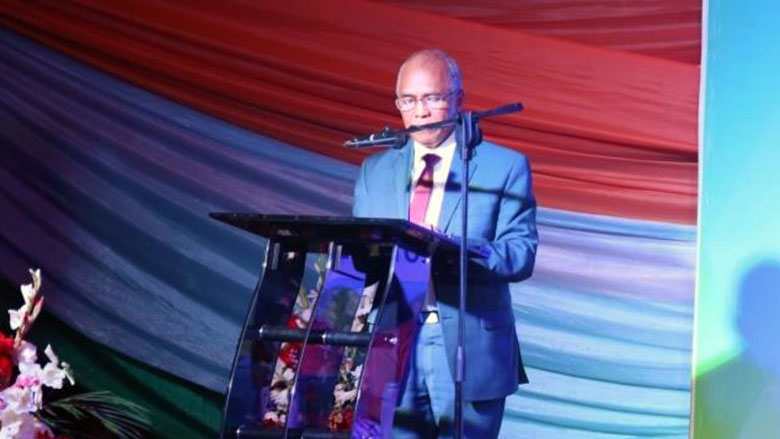ANTANANARIVO, November 15, 2016 – Over 130 representatives from the accountancy profession gathered in Madagascar this past October for an annual meeting addressing public finance management in Francophone Africa.
At the heart of this meeting was a call to accelerate reforms that would strengthen public finance institutions across the region. “There is a need to further modernize public services, tax authorities, supreme audit institutions (SAIs), general inspection units, and internal audit units,” explained Francois Marie Maurice Gervais Rakotoarimanana, Madagascar’s Minister of Finance. “We should also work towards integrating more accountants in public administrations to enhance services to citizens.”
The conference, hosted by the Pan African Federation of Accountants (PAFA) and the Fédération Internationale Des Experts-Comptables Francophones (FIDEF) with support from the World Bank, the African Development Bank, and the International Federation of Accountants (IFAC), enabled delegates from 15 Francophone African countries to identify and discuss a number of action-oriented solutions that the accountancy profession, in partnership with governments and developments partners, could implement to enhance the transparency and efficiency of national public finance institutions.
One solution discussed during the conference involved strengthening Professional Accountancy Organizations (PAOs) in the region in order to develop more technicians and professional accountants that serve both the public and private sectors’ needs. PAOs are membership bodies comprised of individual professional accountants, auditors, and accounting technicians who perform a variety of roles in the accountancy field and adhere to high-quality standards of practice. Strong, effective PAOs act in the public interest and are integral to the delivery of public value globally as proponents of good corporate governance and appliers of consistent global standards.
The preliminary findings of a study conducted by the World Bank and IFAC on the status of financial reporting and the accountancy profession in Francophone Africa revealed that PAO membership is very low – only accountants working in the audit practice are registered as members of PAOs. This differs from membership in English speaking countries where membership is open to all qualified technicians and professional accountants working in any sector in the country. As a result, the delegates agreed to revisit the current operating practices of PAOs in Francophone countries with the aim of opening membership access to all qualified accountants. The report indicated that currently, PAOs in Francophone Africa are weak, lacking the necessary resources, knowledge, and skills to perform their roles. However, with more inclusive membership, Francophone PAOs have the power to support the production of high-quality financial information, contributing to public and private sector development, economic growth, and the effectiveness of international aid.
Another solution discussed by delegates proposed building a stronger relationship between the accountancy profession and the public sector. Experiences shared during the conference showed that current working relationships are weak. The delegates urged the accountancy profession to take the time to understand how the public sector functions, build relationships with the government, and develop services and products that address the needs of the public sector, especially those related to improving financial reporting, governance, and financial management systems. For example, a PAO in Senegal is supporting supreme audit institutions in staff training and the conduct of audits. The Francophone accountancy profession is encouraged to learn from the Anglophone PAOs’ experience in developing strong working relationships with the public sector.
Evidence and experience shared during the conference indicated that only a small number of accountants work in the public sector. The delegates stressed the need to be innovative and creative in developing, attracting, and retaining technicians and professional accountants to serve in the public sector. In order to do so, public institutions could develop career paths for young accountants that offer challenging and stimulating assignments, recognize their added value, reward their contributions, and provide learning and networking opportunities beyond their borders.
Participants reviewed examples of solution-based approaches such as the one developed by Confederation of Asian and Pacific Accountants (CAPA) to help jurisdictions embrace the challenge of identifying, attracting, and retaining professional accountants and other key financial personnel in the public sector. The increase in skilled accountants help public sector institutions enhance the quality of financial reports that in turn influence decision making, transparency, and tax revenue collection. “The accountancy profession should play a key role in supporting governments to collect as much revenue as possible” said Mohamed Hdid, president of FIDEF.
Chiara Bronchi, World Bank Practice Manager in the Governance Global Practice, presented the different ways in which the World Bank supports public finance management institutions and emphasized the need for the accountancy profession to support civil societies, media, and the public to understand audited financial statements in order to fulfill the demand of greater governance on behalf of citizens. “The World Bank remains committed to collaborating with the accountancy profession and the government to continue strengthening institutions in order to end poverty and boost shared prosperity,” concluded Bronchi.

